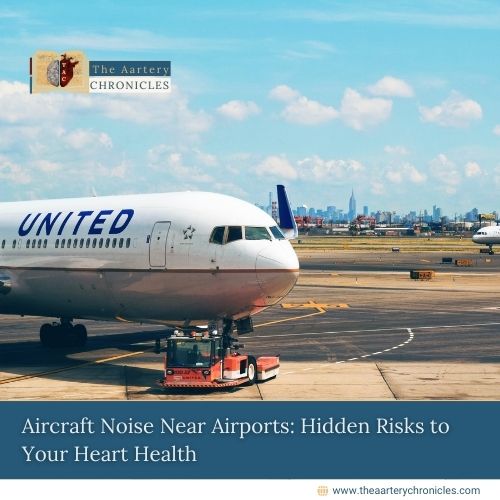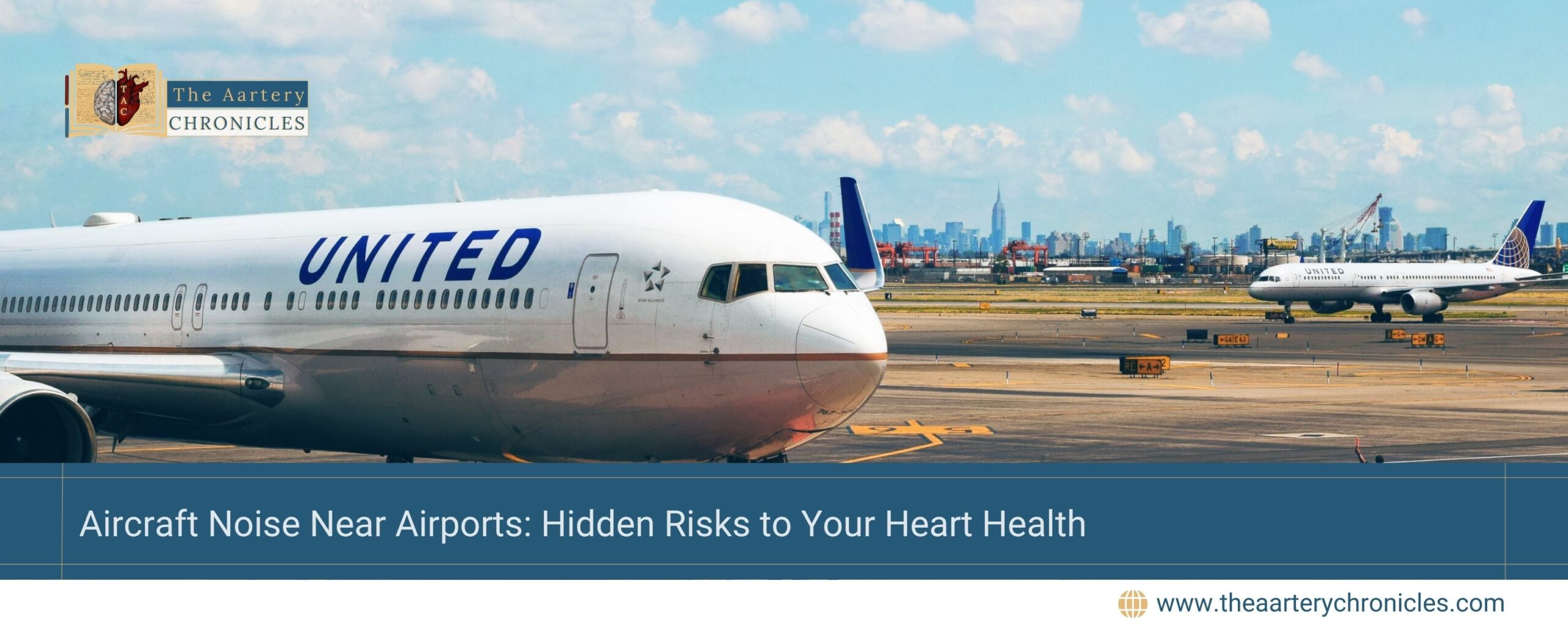

Aircraft Noise and Heart Health: How Living Near Airports Can Impact Your Heart
Living near an airport might sound convenient for travel, but it could come with hidden health risks. A recent study led by University College London (UCL) researchers reveals that high levels of aircraft noise might negatively impact heart health, increasing the risk of
- Heart attacks
- Irregular heart rhythms
- Strokes
What Did the Study Find?
Published in the Journal of the American College of Cardiology (JACC), the study analyzed heart imaging data from 3,635 individuals residing near major airports in England, including Heathrow, Gatwick, Birmingham, and Manchester.
The researchers compared the hearts of those exposed to higher aircraft noise levels with those in quieter areas. The results were alarming:
- Stiffer, Thicker Heart Muscles: People in high-noise areas had hearts that struggled to pump blood efficiently.
- Night Noise Worsens Impact: Exposure to aircraft noise at night, when sleep is disrupted, had a more pronounced effect on heart health
How Noise Affects the Heart
Aircraft noise doesn’t just disturb your peace; it can also activate the body’s stress response:
- Sympathetic Nervous System Overdrive: This “fight or flight” response raises
- Blood pressure
- Constricts arteries
- Releases cortisol, a stress hormone linked to weight gain
- Poor Sleep Quality: Night-time noise interrupts sleep, essential for heart health.
Why Aircraft Noise Is Particularly Harmful
Unlike road or rail noise, aircraft noise is intermittent and unpredictable, making it harder for people to adapt. This unpredictability, combined with its loudness, can lead to chronic stress.
The Bigger Picture: Noise and Heart Abnormalities
The study found that heart abnormalities caused by aircraft noise could double or even quadruple the risk of major cardiac events, such as heart attacks and strokes. Among participants:
- It was observed in the study that up to 50% of the noise-related heart risk was linked to higher body mass index (BMI).
- The study also found out that 9-36% of the risk was attributed to elevated blood pressure, especially in those exposed to daytime aircraft noise.
What Can Be Done?
Dr Gaby Captur, the study’s senior author, emphasised the need for action:
“Government and industry must work together to reduce aircraft noise exposure and protect the health of millions living near airports.”
In addition to noise reduction, there are proactive steps individuals can take to safeguard their heart health:
- Healthy Lifestyle: Eat a balanced diet, stay active, and maintain a healthy weight.
- Quit Smoking: If you smoke, quitting can significantly reduce heart risks.
- Monitor Health: Keep conditions like high blood pressure and diabetes under control.
- Follow Medical Advice: Take prescribed medications, such as cholesterol-lowering drugs, as directed.
Who is most at Risk?
The World Health Organization recommends keeping aircraft noise
- Below 45 decibels during the day
- Below 40 decibels at night
However, the study found that 8% of participants lived in areas exceeding these limits during the day, with 3% exposed to high noise levels at night.
Key Takeaways from Study
- Heart Health Impact: Long-term exposure to aircraft noise can lead to maladaptive thickening of heart muscles, making the heart less efficient.
- Increased Risk of Cardiac Events: Heart abnormalities linked to noise exposure significantly raise the risk of heart attacks, strokes, and arrhythmias.
- Call for Further Research: While the study is observational, it highlights the urgent need for more research into the long-term effects of noise pollution.
What the Experts Say
Professor James Leiper from the British Heart Foundation remarked:
“For most of us, a plane symbolises travel and relaxation. But for those living near airports, the noise could silently harm their heart health.”
Protecting Your Heart Amid Noise Pollution
While reducing aircraft noise requires systemic changes, individuals can take steps to minimize the impact:
- Use white noise machines or earplugs to improve sleep quality.
- Advocate for noise reduction measures in your community.
- Regularly consult healthcare providers to monitor and manage heart health.
The Funding Behind the Study
This groundbreaking research was supported by the Medical Research Council, British Cardiovascular Society, British Heart Foundation, UCL Charlotte and Yule Bogue Research Fellowship, and the National Institute for Health and Care Research (NIHR).
Aircraft noise is more than just an annoyance—it’s a potential health hazard. By raising awareness and taking preventive measures, we can work towards a healthier future for those living near airports.
Source: Inputs from various media Sources

Dane
I am an MBBS graduate and a dedicated medical writer with a strong passion for deep research and psychology. I enjoy breaking down complex medical topics into engaging, easy-to-understand content, aiming to educate and inspire readers by exploring the fascinating connection between health, science, and the human mind.








